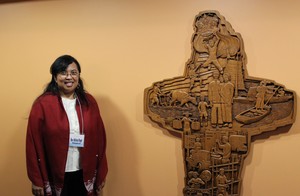Eleven international peacemakers from around the world are visiting congregations, presbyteries and colleges of the Presbyterian Church (U.S.A.) Sept. 27-Oct. 21.
They are sharing their stories about church-based ministries in their countries that seek peace justice and pursue peace in the name of Jesus Christ. This year’s international peacemakers come from Bolivia, Colombia, Iran, Iraq, Israel/Palestine, Jamaica, Madagascar, Niger, Northern Ireland, South Sudan and Syria.
The International Peacemaker program is sponsored by the Presbyterian Peacemaking Program.
Since her ordination in 1989, the Rev. Helivao Poget has ministered to the marginalized people of Madagascar’s capital, Antananarivo, through her street ministry. Poget works with church organizations to peacefully resolve the political crisis that began in Madagascar in March of 2009.
Poget will be visiting the Synod of Lakes and Prairies, Hastings College and the presbyteries of East Iowa, Central Nebraska, Central Florida and Peace River.
What is the situation in your country that you will be addressing?
There are more than 8,000 homeless people that we are working with attempting to improve their human dignity — physically, intellectually, and spiritually.
This means we work to feed, clothe, teach language and job skills, pray for, have Bible studies with and teach manners to those living in the streets.
We work to give them an opportunity for housing — this is such a critical part of our street ministry work. The first question we ask in our culture is. ‘Where are you from?’ So you see how this would give a person a whole new identity.
How are the faith communities trying to address this situation?
We are working on reconciliation now with the Federation of Christians in Madagascar and political groups in our country.
We are giving them both the opportunity to express their ideas, with all of us beginning to understand that we must together look for and create good solutions for all our people.
This mediation work is between ‘Malagasy and Malagasy.’ Peace and reconciliation from within.
What lessons from your situation are you trying to communicate to U.S. Presbyterians?
Pray for us because as we speak about reconciliation we increasingly realize that the church of God in Madagascar needs to be reconciled with each other.
There are four big churches in Madagascar — Reformed, Catholic, Lutheran and Anglican. As we become more united in Christ, then we can work at peace and reconciliation with all Malagasy.
What is the primary message you want to communicate to U.S. Presbyterians?
I want you all to know the joy I witness on a daily basis from the homeless. There is no suicide in the homeless people. They take care of each other, in their own solidarity with each other.
Together we are learning how keep life in God’s and we keep fighting with God for human dignity and resolution to our political crisis.

